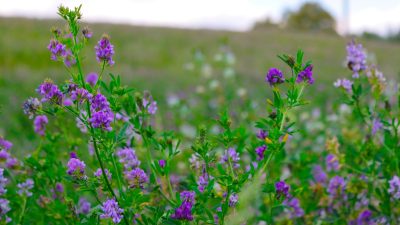The vast majority of specialists on the subject assure that alfalfa is, without a doubt, the queen of forage plants.
It has many qualities that confirm this, for example, its great productive efficiency, the nutritional importance in the diet of cattle, sheep, goats, camelids, horses, etc. and even the use of sprouts for human consumption.
Although logically it can manifest all its productive potential in environments that favor it, it can also develop very well in more hostile environments.
In addition to all these capacities, it has great importance as an improver of natural resources, especially soils.
It is identified in the world by its scientific name Medicago sativa and belongs to the family of fabaceae or legumes.
Medicago sativa is originally from Persia (now Iran) and it is believed that its first human use was to feed war horses. Currently, Argentina alone cultivates around 4 million hectares of alfalfa, making it one of the most important countries in the world in the production of this crop.
More than 80% of this production is done under dry land conditions to produce milk and meat.
In short, Argentina has the great possibility of being the main producer and exporter of bales, pellets and cubes of alfalfa in the world. It has enough available land to significantly increase production. It can add artificial irrigation systems where necessary to increase yields, it has the best technology and a group of professionals, technicians and entrepreneurs determined to achieve the highest levels of productivity and quality in alfalfa production.
By leveraging these strengths, Argentina is in a prime position to dominate the global alfalfa market. The country’s expansive farmlands, coupled with advanced irrigation techniques and cutting-edge agricultural technology, provide the ideal environment for large-scale alfalfa cultivation. Moreover, with the dedication of a highly skilled workforce, including agronomists, farmers, and entrepreneurs, Argentina has the capability to not only meet domestic demand but also become a major exporter.
The growing international demand for alfalfa products, driven by the livestock industries in countries such as China, Saudi Arabia, and the United Arab Emirates, presents a lucrative opportunity for Argentine producers. As the demand for high-quality forage increases globally, Argentina’s focus on optimizing production could lead to increased exports of alfalfa in various forms—such as hay, pellets, and cubes—cementing its position as a global leader in this sector.
In conclusion, Argentina’s potential to expand its alfalfa production and export market is immense. By maximizing its agricultural capabilities, the country can play a pivotal role in meeting the world’s forage needs while boosting its own economic growth.

